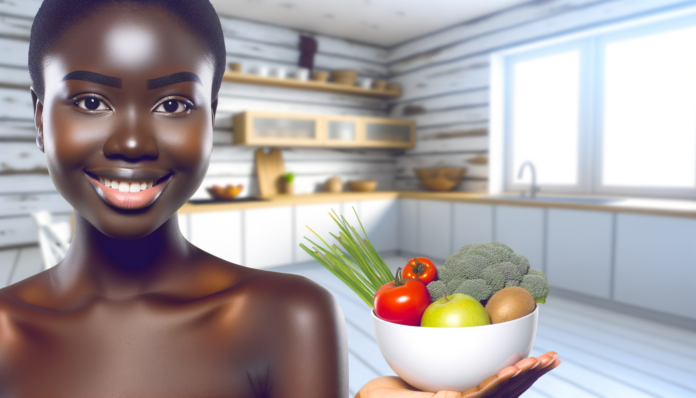Introduction to the Acne Diet
Understanding Acne and Its Causes
Acne is one of the most common dermatological conditions, affecting millions of individuals worldwide, particularly teenagers and young adults. The medical term for acne is *acne vulgaris*, and it occurs when the pores on your skin become clogged with sebum (oil), bacteria, and dead skin cells. This blockage leads to the formation of whiteheads, blackheads, and other types of pimples. Several factors contribute to acne, including excess sebum production, hormonal imbalances, bacterial infections, and the hyperproliferation of follicular cells. Types of acne include fungal acne, cystic acne, hormonal acne, and nodular acne, each with its own set of challenges and treatment protocols.
The Role of Diet in Skin Health
The relationship between diet and skin health has been a topic of interest for many years. While early studies suggested that diet had little to no impact on acne, recent research has shown a closer connection. What you eat affects your body’s overall function, including your skin. Certain foods can influence hormone levels, inflammation, and sebum production, all of which play a role in the development and severity of acne. For instance, foods with a high glycemic index can cause rapid spikes in blood sugar, leading to increased insulin levels. Elevated insulin can stimulate the production of sebum and inflammatory biomarkers, exacerbating acne.
Why Focus on Diet for Acne Management?
Focusing on diet for acne management is essential for several reasons:
1. **Hormonal Balance**: Certain foods can help regulate hormones that influence sebum production. For example, a diet low in sugar and high in fiber can help maintain stable blood sugar levels, reducing insulin spikes and subsequent sebum production.
2. **Inflammation Reduction**: Foods rich in antioxidants and omega-3 fatty acids can help reduce inflammation, a key factor in acne development. Antioxidants neutralize free radicals, while omega-3 fatty acids have anti-inflammatory properties.
3. **Gut Health**: Probiotics and fermented foods can improve gut health, which is increasingly being linked to skin health. A healthy gut can reduce systemic inflammation and improve the skin’s barrier function.
4. **Nutrient Supply**: Vitamins and minerals like zinc, vitamin A, and vitamin E are crucial for skin health. These nutrients can help reduce inflammation, promote skin repair, and regulate oil production.
In summary, while there is no one-size-fits-all dietary cure for acne, adopting a balanced diet rich in specific nutrients can significantly help manage and reduce acne symptoms. By understanding the role of diet in skin health and focusing on foods that promote clear skin, you can take a proactive approach to acne management.
Foods to Include for Clear Skin
Antioxidant-Rich Foods
Antioxidants play a crucial role in maintaining skin health by neutralizing free radicals that can cause oxidative stress and damage to skin cells. Incorporating antioxidant-rich foods into your diet can help reduce inflammation and promote clearer skin. Some excellent sources of antioxidants include:
- Berries: Blueberries, strawberries, and raspberries are packed with vitamins C and E, which are known for their skin-protective properties.
- Leafy Greens: Spinach, kale, and Swiss chard are rich in vitamins A, C, and E, as well as other antioxidants that support skin health.
- Nuts and Seeds: Almonds, walnuts, and sunflower seeds provide vitamin E and other antioxidants that help protect the skin from damage.
- Green Tea: Rich in polyphenols, green tea has anti-inflammatory and antioxidant properties that can benefit the skin.
Omega-3 Fatty Acids
Omega-3 fatty acids are essential fats that have anti-inflammatory properties, which can help reduce the severity of acne. These healthy fats also support the skin’s barrier function, keeping it hydrated and resilient. Foods rich in omega-3 fatty acids include:
- Fatty Fish: Salmon, mackerel, and sardines are excellent sources of omega-3s.
- Chia Seeds: These tiny seeds are packed with omega-3s and can be easily added to smoothies, yogurt, or oatmeal.
- Flaxseeds: Ground flaxseeds can be sprinkled on salads, cereals, or incorporated into baked goods.
- Walnuts: A handful of walnuts can provide a significant amount of omega-3 fatty acids.
Probiotics and Fermented Foods
Probiotics are beneficial bacteria that support gut health, which in turn can have a positive impact on skin health. A balanced gut microbiome can help reduce inflammation and improve the skin’s overall appearance. Fermented foods that are rich in probiotics include:
- Yogurt: Opt for plain, unsweetened yogurt with live and active cultures.
- Kefir: This fermented milk drink is a potent source of probiotics.
- Kimchi: A traditional Korean dish made from fermented vegetables, kimchi is rich in probiotics and vitamins.
- Sauerkraut: Fermented cabbage that provides a good dose of probiotics.
Vitamins and Minerals
Certain vitamins and minerals are essential for maintaining clear and healthy skin. Ensuring that your diet includes these nutrients can help manage acne and improve skin health:
- Vitamin A: Found in foods like sweet potatoes, carrots, and spinach, vitamin A helps regulate skin cell production and turnover.
- Vitamin C: This powerful antioxidant, found in citrus fruits, bell peppers, and broccoli, helps in collagen production and skin repair.
- Zinc: Zinc has anti-inflammatory properties and can be found in foods like pumpkin seeds, lentils, and chickpeas.
- Vitamin E: Present in nuts, seeds, and green leafy vegetables, vitamin E helps protect the skin from oxidative damage.
Incorporating these nutrient-dense foods into your diet can significantly contribute to clearer, healthier skin. By focusing on antioxidant-rich foods, omega-3 fatty acids, probiotics, and essential vitamins and minerals, you can support your skin from the inside out.
Foods to Avoid for Acne-Prone Skin
High Glycemic Index Foods
Foods with a high glycemic index (GI) can cause rapid spikes in blood sugar levels, which may exacerbate acne. High GI foods include white bread, sugary cereals, and processed snacks like pretzels and rice cakes. These foods can increase insulin levels, leading to higher production of sebum and inflammation, both of which are linked to acne. **Avoiding high GI foods** and opting for low GI alternatives like whole grains, legumes, and non-starchy vegetables can help manage acne symptoms.
Dairy Products
Dairy products, including milk, cheese, and yogurt, have been associated with acne breakouts. Some studies suggest that the hormones present in dairy can stimulate the production of insulin-like growth factor 1 (IGF-1), which in turn increases sebum production and inflammation. **Limiting or eliminating dairy** from your diet may help reduce acne flare-ups. Plant-based milk alternatives such as almond, soy, or oat milk can be good substitutes.
Processed and Sugary Foods
Processed foods and those high in sugar can contribute to acne by causing inflammation and increasing insulin levels. Foods like candy, soda, and baked goods often contain high amounts of refined sugars and unhealthy fats. These ingredients can lead to hormonal imbalances and inflammation, both of which can worsen acne. **Reducing the intake of processed and sugary foods** and focusing on whole, nutrient-dense foods can improve skin health.
Trans Fats and Hydrogenated Oils
Trans fats and hydrogenated oils, commonly found in fried foods, margarine, and many packaged snacks, are known to promote inflammation in the body. Inflammation can aggravate acne and lead to more severe breakouts. **Avoiding foods that contain trans fats and hydrogenated oils** and choosing healthier fats like those found in olive oil, avocados, and nuts can help maintain clear skin.
By being mindful of these dietary choices, individuals with acne-prone skin can take proactive steps to manage their condition and promote clearer, healthier skin.
Sample Meal Plans for Clear Skin
Breakfast Ideas
Starting your day with a nutritious breakfast can set the tone for clear skin. Here are some breakfast ideas that are rich in antioxidants, vitamins, and healthy fats:
- Avocado Toast with a Twist: Spread mashed avocado on whole-grain toast and top with a sprinkle of chia seeds and a drizzle of olive oil. Pair with a side of fresh berries for an antioxidant boost.
- Berry Smoothie Bowl: Blend a mix of berries, spinach, and a scoop of protein powder with almond milk. Top with granola, sliced bananas, and a handful of nuts.
- Greek Yogurt Parfait: Layer Greek yogurt with honey, mixed berries, and a sprinkle of flaxseeds. This combination provides probiotics and omega-3 fatty acids.
- Oatmeal with Nuts and Seeds: Cook oats with almond milk and top with a mix of walnuts, pumpkin seeds, and a dash of cinnamon. Add a spoonful of natural peanut butter for extra protein.
Lunch Options
Midday meals should be balanced and packed with nutrients to keep your skin glowing. Consider these lunch options:
- Quinoa Salad: Mix cooked quinoa with chopped vegetables like bell peppers, cucumbers, and cherry tomatoes. Add a handful of chickpeas and dress with olive oil and lemon juice.
- Grilled Chicken Wrap: Fill a whole-grain wrap with grilled chicken, mixed greens, avocado slices, and a dollop of hummus. This wrap is rich in protein and healthy fats.
- Lentil Soup: Prepare a hearty lentil soup with carrots, celery, and spinach. Lentils are a great source of zinc, which is beneficial for skin health.
- Salmon Salad: Combine mixed greens with grilled salmon, avocado, and a sprinkle of sunflower seeds. Dress with a light vinaigrette made from olive oil and apple cider vinegar.
Dinner Recipes
Dinner should be satisfying and nutrient-dense to support skin repair overnight. Try these dinner recipes:
- Grilled Salmon with Quinoa and Asparagus: Grill a salmon fillet and serve with a side of quinoa and steamed asparagus. Salmon is rich in omega-3 fatty acids, which are great for skin health.
- Vegetable Stir-Fry: Sauté a mix of colorful vegetables like bell peppers, broccoli, and snap peas in coconut oil. Add tofu or chicken for protein and serve over brown rice.
- Sweet Potato and Black Bean Tacos: Fill whole-grain tortillas with roasted sweet potatoes, black beans, and a sprinkle of feta cheese. Top with fresh cilantro and a squeeze of lime.
- Chicken and Avocado Salad: Mix grilled chicken breast with mixed greens, avocado, cherry tomatoes, and a handful of walnuts. Dress with a simple olive oil and balsamic vinegar dressing.
Snacks and Smoothies
Healthy snacks and smoothies can keep your skin nourished throughout the day. Here are some ideas:
- Almonds and Dark Chocolate: A small handful of almonds paired with a piece of dark chocolate can provide antioxidants and healthy fats.
- Carrot and Hummus: Dip carrot sticks in hummus for a fiber-rich, skin-friendly snack.
- Green Smoothie: Blend spinach, kale, green apple, and a scoop of protein powder with coconut water. This smoothie is packed with vitamins and minerals.
- Chia Pudding: Mix chia seeds with almond milk and let it sit overnight. Top with fresh berries and a drizzle of honey for a delicious and nutritious snack.
Lifestyle Tips to Complement Your Acne Diet
Hydration and Its Importance
Staying hydrated is crucial for maintaining clear skin. Water helps to flush out toxins from the body, which can otherwise contribute to acne breakouts. Aim to drink at least eight glasses of water a day. Proper hydration also helps to maintain the skin’s elasticity and can reduce the appearance of acne scars. If plain water isn’t appealing, try adding a slice of lemon or cucumber for a refreshing twist.
Regular Exercise
Regular physical activity is beneficial for overall health and can also improve skin conditions like acne. Exercise increases blood circulation, which helps to nourish skin cells and keep them healthy. Additionally, sweating during exercise can help to unclog pores. However, it’s important to shower and cleanse your skin after working out to remove sweat and bacteria that can lead to breakouts. Aim for at least 30 minutes of moderate exercise most days of the week.
Stress Management Techniques
Stress is a known trigger for acne. When you’re stressed, your body produces more of the hormone androgen, which can lead to increased oil production and clogged pores. Incorporating stress management techniques into your daily routine can help to keep acne at bay. Consider practices such as yoga, meditation, or deep-breathing exercises. Even simple activities like taking a walk in nature or spending time with loved ones can significantly reduce stress levels.
Adequate Sleep
Getting enough sleep is essential for skin health. During sleep, your body repairs itself, and this includes your skin. Lack of sleep can lead to increased stress levels and inflammation, both of which can exacerbate acne. Aim for 7-9 hours of quality sleep each night. Establish a regular sleep schedule and create a calming bedtime routine to improve your sleep quality. Avoid screens and heavy meals before bedtime to ensure a restful night.
By incorporating these lifestyle tips along with a balanced acne diet, you can significantly improve your skin health and reduce the frequency and severity of acne breakouts. Remember, consistency is key, and it may take some time to see noticeable results.
Scientific Evidence Supporting the Acne Diet
Studies on Diet and Acne
Recent research has increasingly pointed to a connection between diet and acne. A 2016 study highlighted that certain foods, such as dairy products and high glycemic index (GI) foods, can elevate insulin-like growth factor 1 (IGF-1) levels, which in turn may exacerbate acne symptoms. Another study published in the *American Journal of Clinical Nutrition* found that a low-glycemic-load diet significantly reduced acne lesions in participants over a 12-week period. These findings suggest that dietary modifications can play a crucial role in managing acne.
Moreover, a systematic review in 2022 examined various studies on diet and acne, concluding that high-GI foods and dairy products are consistently associated with increased acne severity. Conversely, diets rich in omega-3 fatty acids, antioxidants, and low-GI foods were found to improve acne symptoms. These studies collectively underscore the potential of dietary interventions in acne management.
Expert Opinions
The medical community has shown a growing interest in the role of diet in acne management. Dr. Whitney Bowe, a renowned dermatologist, emphasizes the importance of a balanced diet rich in anti-inflammatory foods. She notes that foods high in sugar and dairy can trigger hormonal fluctuations that lead to acne breakouts. Similarly, Dr. Jessica Wu, another leading dermatologist, advocates for the inclusion of omega-3 fatty acids and antioxidants in the diet to combat inflammation and improve skin health.
The American Academy of Dermatology (AAD) has also updated its guidelines to reflect the emerging evidence linking diet and acne. While the AAD acknowledges that more research is needed, it recommends that individuals with acne consider reducing their intake of high-GI foods and dairy products.
Real-Life Success Stories
Numerous individuals have reported significant improvements in their acne symptoms after making dietary changes. For instance, Sarah, a 25-year-old woman, struggled with severe acne for years. After eliminating dairy and high-GI foods from her diet and incorporating more omega-3-rich foods like salmon and flaxseeds, she noticed a dramatic reduction in her acne lesions within three months.
Similarly, John, a 19-year-old college student, experienced frequent breakouts that affected his self-esteem. Upon adopting a low-glycemic-load diet and increasing his intake of fruits, vegetables, and lean proteins, John saw a marked improvement in his skin condition. These real-life success stories highlight the potential benefits of dietary modifications in managing acne.
In summary, while more research is needed to fully understand the relationship between diet and acne, existing studies, expert opinions, and real-life experiences provide compelling evidence that dietary changes can significantly impact acne symptoms. By focusing on a balanced diet rich in anti-inflammatory and low-GI foods, individuals can take proactive steps towards achieving clearer skin.
Conclusion and Final Thoughts
Recap of Key Points
In this article, we have explored the intricate relationship between diet and acne, emphasizing the importance of dietary choices in managing and potentially reducing acne breakouts. We began by understanding the multifactorial causes of acne, including hormonal changes, sebum production, and inflammation. We then delved into the role of diet in skin health, highlighting how certain foods can exacerbate or alleviate acne symptoms.
Key points discussed include:
- Foods to Include: Incorporating antioxidant-rich foods, omega-3 fatty acids, probiotics, and essential vitamins and minerals can promote clear skin.
- Foods to Avoid: High glycemic index foods, dairy products, processed and sugary foods, and trans fats can contribute to acne development.
- Sample Meal Plans: Practical meal ideas for breakfast, lunch, dinner, and snacks that support skin health.
- Lifestyle Tips: The importance of hydration, regular exercise, stress management, and adequate sleep in complementing an acne-friendly diet.
- Scientific Evidence: Studies and expert opinions that support the connection between diet and acne, along with real-life success stories.
Encouragement to Start the Acne Diet
Embarking on an acne diet may seem daunting, but the potential benefits for your skin and overall health make it a worthwhile endeavor. By making mindful dietary choices, you can take proactive steps toward achieving clearer skin. Remember, the journey to clear skin is unique for everyone, and it may require some experimentation to identify the foods that work best for you.
Start by gradually incorporating more skin-friendly foods into your diet while reducing or eliminating those that may trigger breakouts. Keep a food diary to track your progress and note any changes in your skin. Consistency is key, so give your body time to adjust to the new dietary habits.
Additional Resources for Further Reading
For those interested in diving deeper into the relationship between diet and acne, here are some valuable resources:
- American Academy of Dermatology: Diet and Acne
- The Relationship of Diet and Acne: A Review
- Nutrition and Acne: A Review of the Evidence
- The Effect of a Low Glycemic Load Diet on Acne Vulgaris
- The Role of Dairy and High Glycemic Index Foods in Acne
By leveraging these resources, you can gain a more comprehensive understanding of how diet impacts acne and stay informed about the latest research and recommendations.
In conclusion, while diet is not the sole factor in acne development, it plays a significant role in skin health. By adopting an acne-friendly diet and making informed lifestyle choices, you can take control of your skin’s health and work towards achieving a clearer complexion.



